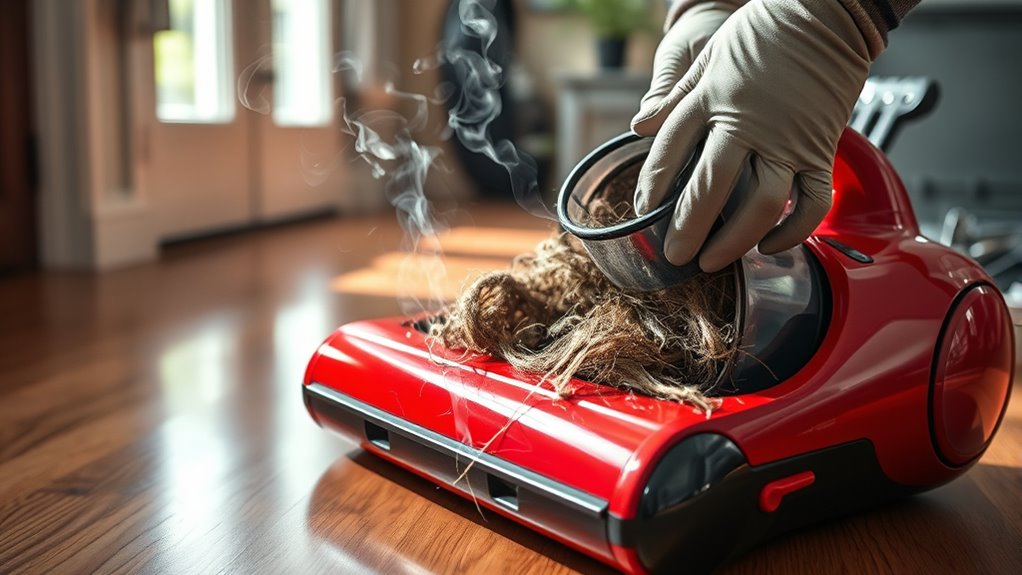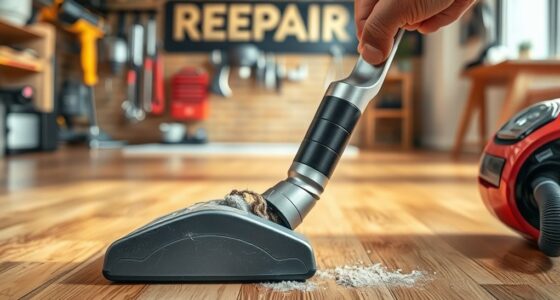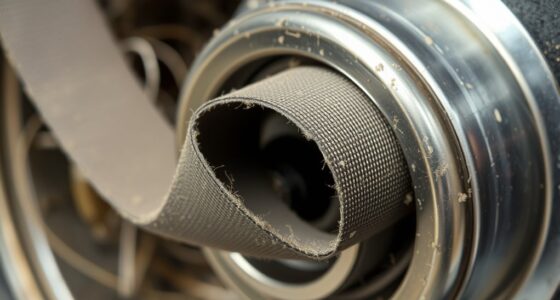If your vacuum smells like it’s burning, it’s vital to act fast. First, check for clogs in the hose and empty the dustbin. Clean or replace dirty filters and inspect the brush roll for hair buildup. Also, look for a frayed or worn belt, as it can cause friction and overheating. Disconnect the power before checking these parts. By addressing these issues, you can prevent damage and improve functionality. More tips await to help you fix the problem effectively.
Key Takeaways
- Inspect and clear any blockages in the hose or filters to prevent motor overheating.
- Check the vacuum’s belts for signs of wear, fraying, or slipping and replace if necessary.
- Clean or replace filters regularly, especially HEPA filters, to maintain proper airflow.
- Remove hair and debris from the brush roll to ensure efficient operation.
- Disconnect the vacuum from power before performing any maintenance or inspections.

Have you ever noticed a burning smell coming from your vacuum while cleaning? It can be alarming, and you might worry something’s seriously wrong. The burning smell often indicates two common issues: motor overheating or a belt malfunction. Understanding these problems can help you address them quickly and keep your vacuum running smoothly.
Noticing a burning smell from your vacuum? It could mean motor overheating or a belt issue—understanding this can help you troubleshoot effectively.
First, let’s talk about motor overheating. When you use your vacuum, the motor works hard to create suction. However, if you’ve got a clog somewhere in the hose or the filter is too dirty, the motor has to work even harder. This strain can cause the motor to overheat, leading to that unpleasant burning smell. To prevent this, regularly check your vacuum for blockages. Clear out any debris, and make sure the filters are clean. If your vacuum has a HEPA filter, it’s essential to replace it according to the manufacturer’s recommendations. Keeping everything clean can help your vacuum run efficiently and prevent overheating. Additionally, automation in business can streamline maintenance processes, ensuring that your vacuum operates at peak efficiency.
Now, let’s examine belt malfunction. Your vacuum belt connects the motor to the brush roll, allowing it to spin and pick up dirt. Over time, this belt can wear out or become loose, causing it to slip or even burn. If you notice the burning smell, it might be time to inspect the belt. Start by disconnecting the vacuum from the power source and flipping it over to access the brush roll. Look for any signs of wear, such as fraying or cracking. If the belt seems loose or damaged, you’ll need to replace it to restore your vacuum’s performance.
Once you’ve tackled these issues, it’s a good idea to give your vacuum a little TLC. Regular maintenance goes a long way in ensuring it operates efficiently. Keep an eye on the brush roll for hair and debris buildup, and make sure the wheels are turning freely. By staying proactive about maintenance, you can avoid those burning smells and keep your vacuum in good working order.
Frequently Asked Questions
What Causes a Vacuum to Smell Like Burning?
A vacuum can smell like burning due to several reasons. Often, it’s caused by a clogged filter or hose, which makes the motor overheat and produce a burning smell. Sometimes, it’s the belt that’s worn out or misaligned, causing friction and that unpleasant vacuum odor. If you notice this smell, it’s essential to check for blockages or worn parts. Ignoring it could lead to more significant issues down the line.
Can a Burning Smell Damage My Vacuum?
Yes, a burning smell can damage your vacuum. It’s like a warning light flashing in your mind, signaling trouble. If you ignore it, the friction from lack of vacuum lubrication can wear down the motor, and the heat might even compromise the cord insulation. This could lead to electrical hazards or permanent damage. So, when that smell wafts through the air, it’s time to act before your vacuum becomes a costly repair project.
How Often Should I Check My Vacuum for Issues?
You should check your vacuum for issues at least once a month. Regular vacuum maintenance helps prevent airflow issues that can lead to bigger problems. Inspect the filters, hoses, and brush rolls for clogs or wear. If you notice any strange sounds or smells, it’s time to investigate further. By staying proactive, you’ll guarantee your vacuum runs efficiently and lasts longer, saving you time and money in the long run.
Is It Safe to Use a Vacuum With a Burning Smell?
No, it’s not safe to use a vacuum with a burning smell. It could indicate a serious issue, like electrical problems or overheating. You need to prioritize vacuum maintenance and address any strange smells immediately. Unplug the vacuum, inspect the cord and filter, and check for blockages. Ignoring these signs can lead to further damage or even a fire hazard. Always prioritize your electrical safety when dealing with appliances.
When Should I Consider Replacing My Vacuum?
If your vacuum’s starting to resemble a clunky dinosaur instead of a cleaning machine, it might be time to replace it. Consider new options if you notice frequent breakdowns, excessive noise, or persistent odors despite regular vacuum maintenance and odor prevention efforts. Investing in a reliable vacuum can save you time and money, making cleaning less of a chore. Don’t let an outdated vacuum drag you down—upgrade for a fresher, cleaner home!
Conclusion
In the end, a vacuum that once filled your home with a burning smell can transform back into your trusted cleaning companion. By tackling clogged filters and tangled belts, you shift from a cloud of worry to a breeze of relief. Just like a storm clearing to reveal a bright blue sky, your vacuum can once again glide effortlessly across the floor, bringing freshness and peace back into your space. Embrace the change and enjoy cleaner days ahead!









